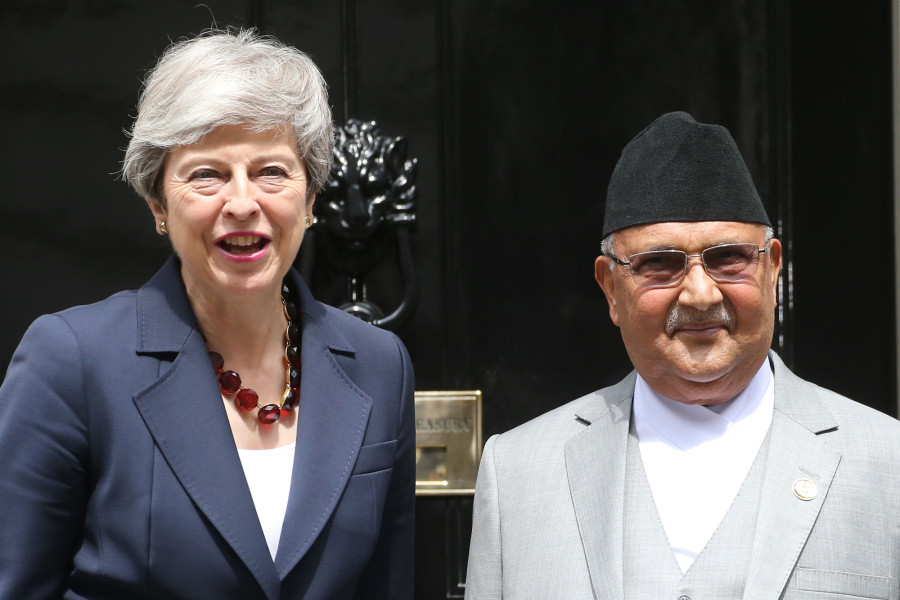Politics
Oli proposed a review of the 1947 tripartite pact in meeting with Theresa May, foreign minister says
The statement from the British prime minister’s office makes no mention of a review of the treaty that allows Gurkha recruitment
Anil Giri
Prime Minister KP Sharma Oli proposed a review of the 1947 tripartite agreement between Nepal, India and Britain during his meeting with outgoing British Prime Minister Theresa May, Foreign Minister Pradeep Gyawali said on Tuesday.
However, a statement issued by a spokesperson for the British prime minister made no mention of Oli’s proposal, adding to the confusion of agitating Gurkha veterans who have long been demanding equal pay.
The statement from 10 Downing Street said that the British prime minister “stressed the important role of the Gurkhas, who continue to serve in the British Armed Forces with honour and distinction” while welcoming the strength of relations between the two countries. May’s office also noted that formal ties have endured for more than 200 years.
Speaking with reporters in London after the meeting between Oli and May, Gyawali said that Prime Minister Oli had proposed a review of the tripartite pact, considered the crux of bilateral ties between the two countries.
The 1947 tripartite agreement between Nepal, India and Britain assures that all perks, remuneration, facilities and pension schemes for Nepalis serving in the British and Indian armies will be equal to those of British and Indian nationals.
However, Gurkha veterans have long alleged that Britain has put in place discriminatory policies in remuneration.
Before Oli left for Europe, Gurkhas had demanded that he initiate talks with the British government as per the report of a joint technical committee and implement the report prepared by the International Labour and Human Rights Commission.
Protesting Gurkhas had threatened to halt recruitment in the British Army from Nepal.
“Prime Minister Oli drew the attention of the British prime minister to the tripartite agreement and resolution of the outstanding issues of British Gurkhas,” Gyawali told the media in London. “In response, the British prime minister said both sides should hold discussions to address the issues of reviewing the tripartite agreement and Gurkhas.”
The British prime minister then took note of the proposal to review the tripartite agreement and replied that both sides will continue to hold discussions to resolve outstanding issues, said Gyawali.
But since the statement from 10 Downing Street made no mention of the tripartite agreement, Gurkha leaders said they were unsure Oli had made any proposal regarding a review of the tripartite agreement during his meeting with May.
“Oli said that he was going to propose a review of the tripartite agreement during his meeting with the British prime minister,” Gyan Rai, coordinator of the Gurkha Joint Satyagraha Committee, told the Post over the phone from London. “The way media reports have surfaced, it looks like Oli made a proposal, but nothing has come from the British side.”
Before meeting with May, Oli had interacted with the Gurkha community in London and said that he was aware of the discrimination against the Gurkhas in the British Army.
“I know about the suffering of Gurkha veterans. They [the British] did not inform us how many recruitments are being made. They did not ask us about the recruitment of women. They do not even share any information with us regarding the deployment of Gurkhas,” Rai quoted Oli as having said.
According to Rai, the Gurkhas want to hear from the British, but their statement says nothing. “This has caused further confusion among the Gurkha community,” he said.
Gurkhas have also demanded that a high-level team be formed to initiate dialogue as per the recommendation made by the Joint Technical Report last year to end the disparity.
But this issue also did not figure in the meeting.
A technical dialogue team had been formed in March 2017 to explore options for a long-term sustainable solution that would address the grievances of Gurkha veterans. The Final Joint Report had been submitted to the Nepali Embassy in London and the British government on March 22 last year.
In the first week of May, after visiting Nepal, British Minister of State for the Armed Forces Mark Lancaster had announced an increased support package for 22,000 Gurkha veterans and their families, according to a statement issued by the British Ministry of Defence.
“The veterans, who all joined the Brigade of Gurkhas before 2007, will benefit from a £15 million [Rs2.2 billion] increase in the Gurkha Pension Scheme. While the increased remuneration will vary depending on an individual’s circumstances, veterans could receive up to 34 percent increase in their pensions with the increments backdated to January 1, 2016. This would mean Gurkha pensioners would receive a total of £46m
[Rs 6.7 billion] extra this financial year,” the British government said in its statement.
Gurkha veterans, however, said that the offer was unacceptable and not in line with the findings of the technical report submitted to both governments.




 14.12°C Kathmandu
14.12°C Kathmandu















